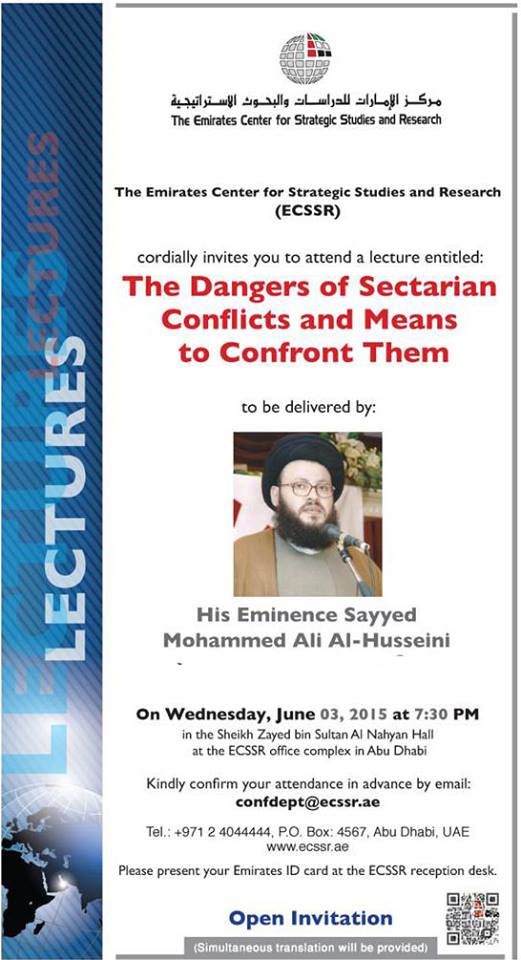|
The Emirates Center for Strategic Studies and Research (ECSSR) hosted a lecture – The Dangers of Sectarian Conflicts and Means to Confront Them – delivered by His Eminence Sayyed Mohamad Ali El Husseini, Secretary-General of The Arab Islamic Council
.jpg)
.
El Husseini :Muslim scholar calls for promoting values of moderate Islam and peaceful existence
El Husseini :He told an audience of politicians, diplomats, media persons and an elite group of social and thought leaders that religion can only be used to attain political gains through misrepresentation, affirming that talk about Sunni Islam and Shia Islam is baseless because they are two schools divided by politics.
Sayyed Mohamad Ali El Husseini In his lecture titled ''The Dangers of Sectarian Conflicts and Means to Confront Them'', the scholar, known of his open political and intellectual stances, spoke about the serious dangers that sectarianism could inflict on the structure of communities and how it accelerates erosion and disintegration of communities from within, turning them into failed states that were plagued by wars and disagreements that deplete their resources and defame their stature.
He warned of a conspiracy to ignite strife inside Islam with the aim of bringing about its implosion although people differ as to who the parties behind this evil plan and its implementation are. Some people, he said, believe it to be the work of major non-Islamic nations while others suggest that one Islamic nation is using sectarian strife to impose its hegemony over the region.
However, the scholar believes that there are a combination of external (non-Islamic) and internal (Islamic) factors at play
.jpg)
.
In this context, sayed mohamad ali el husseini said,'' We find the phenomenon of "Islam within Islam", or those instigating strife within Islam, adhere to their own interpretation of the Holy Quran and the Prophet’s Hadith that deviate from the genuine mission of peaceful Islam, and upon which they rely to promote their own fabricated version of Islam.'' In his view, Daesh were both seeking an alleged caliphate and leadership that justify coercion in the name of religion.
''The forces behind this phenomenon now seek to inflame sectarian and factional wars. If such wars are instigated by emphasising different strains of Islam followed by different parties/factions, logically the solution lies in a return to true, unified Islam. Unfortunately, for complicated historical reasons this prospect has never been pursued. To re-invigorate this proposal, we should work seriously toward achieving reconciliation and rapprochement among conflicting Islamic creeds,'' he said.
Alternatively, he continued, ''We may resort to a contemporary solution that can be drawn from modern nations, such as establishing a non-religious state (a nomocracy rather than a theocracy). In this proposed state, no creed should be declared as the official religion. Thus, it would be similar to a secular state in this respect. However, it would differ from a secular state by virtue of its general affiliation to Islamic law.''
#sayed_mohamad_ali_elhusseini
#sayedelhusseini
#mohamad_el_husseini

|
.jpg)
.jpg)
